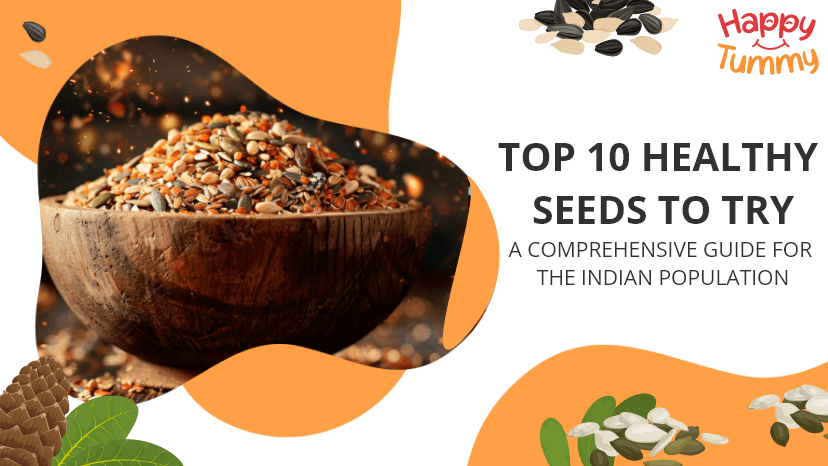Table of Contents
The seeds have always had a special spot in Indian cuisine and culture because of their distinct flavours and the health benefits they deliver. It still often makes one wonder why they are so important. With the rise in the fast-paced modern Indian lifestyle, it has become crucial to emphasise health more than ever.
As per Indian dietary guidelines, the Recommended Dietary Allowance (RDA) for adults is 35 g for nuts and seeds. Likewise, it is 27 g for fats and oils at an intake of approximately 2,000 kcal daily. [1]
Yet only 22% of adults in rural and 27% in urban areas have the recommended nuts and oil seeds. [2]
A considerable Indian population consumes less than the recommended amounts for most micro-nutrients. Seeds, the invisible fats, play a pivotal role in a balanced diet for disease prevention.
Did you know seeds fall under the ‘Group A foods’ categorization based on extent of processing and nutrients (fat,sugar, salt) of concern. [3]
Below is the comprehensive list of the top 10 healthy seeds from the seeds, oilseeds, and spices food groups. We will examine their Indian population specificity benefits. You will also find out how you can add these superfoods to your meals and why they might be beneficial for living more healthily.
Why are Seeds Important?
Did you know seeds fall under the ‘Group A foods’ category? [4]
This means they are free from preservatives, and their edible portions remain unaltered for consumption. In other words, when you choose seeds, you select a raw and natural form of nourishment.
Seeds contain essential fatty acids (EFA), essential amino acids (EAA), and micronutrients.
Among vegetarian food group sources, beej are indispensable to meet the dietary requirements of n-6 PUFAs and LCn-3 PUFA. [5]
Here’s a brief explanation of each fatty acid:
| Type of Fatty Acid | ||
| Long-chain n-3 Polyunsaturated Fatty Acids (LCn-3 PUFAs) | Long-chain n-6 Polyunsaturated Fatty Acids (LCn-6 PUFAs) | |
| Sources in Seeds[6] | Flax seeds Chia seeds Fenugreek seeds | Flax seeds Fenugreek seeds |
| Minimum Requirement (for a 2000 Kcal diet) [7] | 0.6% to 1.2% energy/day Or 20 Kcal or 2.2 gm n-3 | 3% energy/day Or 60 Kcal or 6.6 gm n-6 |
| Health Benefits | Maintain heart health [8] [9]Brain functionality and performance[10]Support immunity [11] | Lipid-lowering effects [12] |
Top 10 Healthy Seeds
When you hear seeds, what is the most common thing that comes to mind?
Are seeds just a snack for health enthusiasts, a dessert ingredient, or merely a topping for drinks and protein shakes?
All of that is true, but the real truth is that if consumed in moderation, beej could improve health.
As we explore the top 10 healthy beej, you will discover their unique properties and how they can contribute to a happy tummy. Let’s discuss each of the beej in detail.
1. Flaxseeds (Alsi)
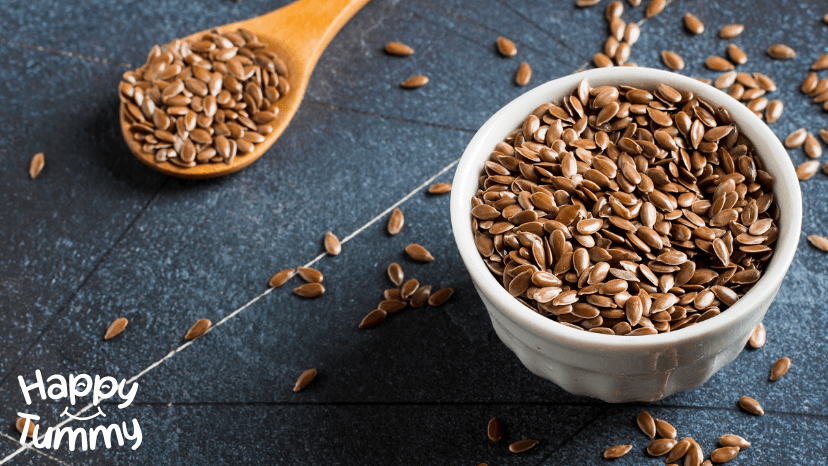
Flaxseeds are a staple in many Indian households and are renowned for their high content of omega-3 fatty acids.
Nutritionists worldwide suggest incorporating omega-3 fatty acid sources into the diet, and flaxseed is the best omega-3 fatty acid source for non-fish eaters. [14]
Health Benefits of Flaxseeds [15] [16] [17]
- It may lower LDL cholesterol levels and provide potential cardiovascular benefits.
- It is an excellent source of fibre content, antioxidants, and omega-3, thus being an effective intervention in prediabetes.
- It might reduce the risks associated with increased body weight.
- It may help to improve inflammation, glycemic status, and oxidative stress among diabetic patients.
- Their laxative effect may aid in digestive health and promote regular bowel movements. [18]
- They have a high content of alpha-linolenic acid (ALA which has potential cardiovascular and anti-inflammatory benefits. [19] [20]
- Flaxseeds contain lignans, which are associated with hormonal balance, antioxidant properties, and prebiotic effects, which may promote the growth of beneficial gut bacteria. [21]
- Flax seeds are gluten-free. Hence, they can be a suitable choice for people suffering from celiac disease or gluten sensitivity conditions.
Pro Tip: Roasted and ground flaxseeds are easier to digest and allow better absorption of omega-3s. To enhance their nutritional content, add them to smoothies, chutneys, yoghurt, or oatmeal.
Easy Flax Seeds Recipe Ideas
- Garlic flaxseeds chutney
- Flaxseeds raita
- Flaxseeds idli podi
- Multigrain roti
You may consider trying Aashirvaad multigrain atta – a blend of power-packed grains that brings flavour and health benefits to your plate.
Just three rotis made from this atta provide 35% of your daily fibre requirement. Experience the difference yourself!
2. Chia Seeds
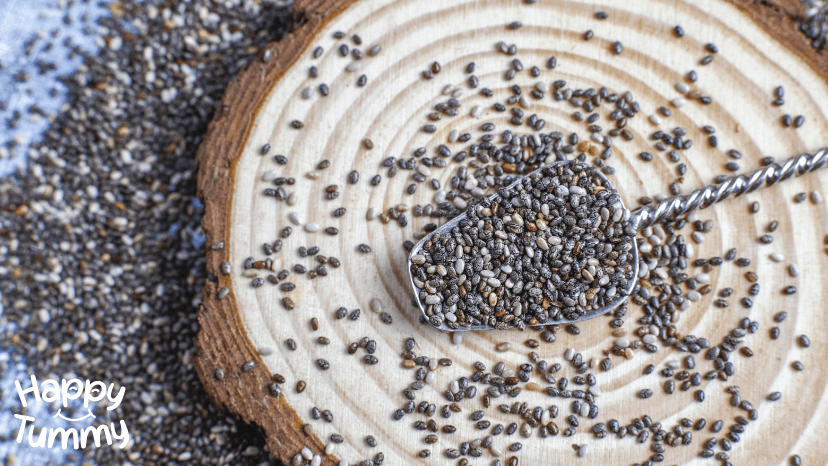
Chia seeds come in shades of black, white, or grey. They are capable of soaking water and expanding 12 times their original size. It creates a gelatinous mixture with a slightly chewy texture, like tapioca pearls. [22] [23]
Health Benefits [24] [25]
- It is rich in omega-3 alpha-linolenic acid (ALA) and may promote heart health.
- It is packed with antioxidants like quercetin and caffeic acid and might protect the body from oxidative stress and free radicals.
- Recognised as a functional food, chia beej might offer various health-benefiting qualities like anti-inflammatory and anti-diabetic.
- It may help you feel full longer and aid in weight loss, which is increasingly important in urban India as obesity rates are rising. [26]
- It contains nutritionally bioactive compounds which may support brain functioning and cognitive performance.
- Have essential omega-6 fatty acids, dietary fibre, proteins, important minerals, and vital vitamins A, C, and E.
Check if you have enough fibre in your meals with the Aashirvaad My Meal Plan test.
Our qualified, certified nutritionists are there with you through all the stages. They provide personalised free meal plans according to your health. Don’t miss this opportunity.
Pro Tip : To make these easier to digest, soak the chia in water or milk overnight to create a gel-like consistency. You can add them to your pudding or sprinkle in salads and cereals.
Easy Chia Seeds Recipe Ideas
- Chia beej curd rice
- Bread made with multi-millet grain and chia beej
- Chia with oatmeal
- Coconut chia beej pudding with mixed fruit recipe
- Kesar mango chia phirni (pudding)
3. Sunflower Seeds
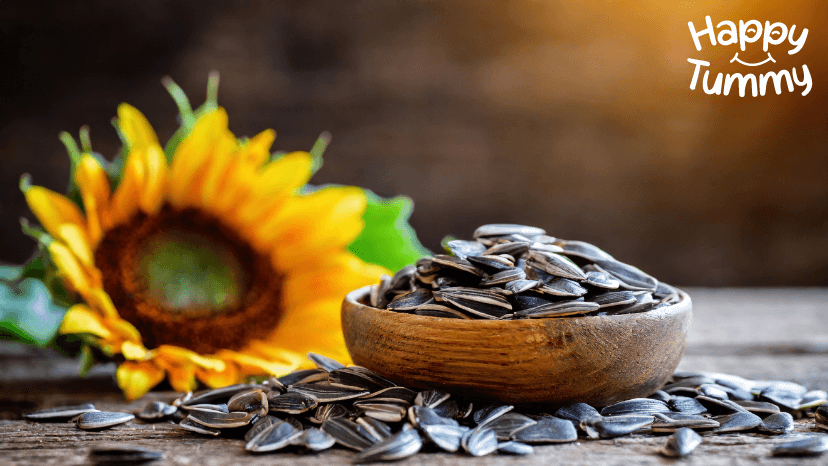
In addition to being a snack, sunflower seeds are rich in healthy types of fats and an antioxidant called vitamin E. [27]
Health Benefits [28]
- The vitamin E content may help in protecting the skin from damage caused by free radicals.
- It may lower the risk of heart disease and reduce inflammation.
- Sunflower seeds contain magnesium, which is beneficial for maintaining bone health.
- They provide all the essential amino acids that the body requires for physiology-related functions.
- Because sunflower seeds are high in protein, they may be an ideal choice to maintain the protein intake in vegan/vegetarian diets.
How to Use
Add sunflower seeds to salads, granola, or yoghurt for an extra nutritious crunch. Or simply have some roasted sunflower beej as your afternoon snack.
Sunflower Seed Recipes
- Sunflower seed butter
- Mixed green salad with sunflower seeds
- In any of the custard or fruit salads, add sunflower beej on top
4. Niger Seeds (Ramtil, Jagni or Jatangi)
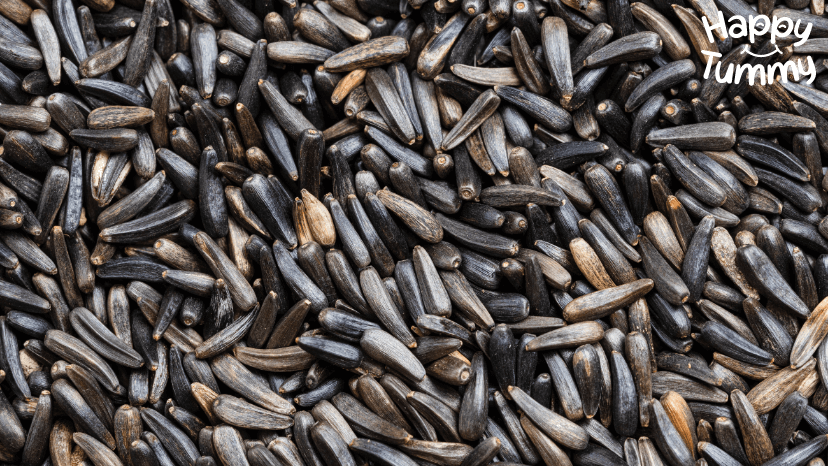
Niger seeds are essential sources of nutrients and have been found to possess therapeutic significance. They are a valuable source of protein, healthy fats, vitamins, and minerals and are crucial to regions with widespread micronutrient deficiencies. [29]
Health Benefits [30]
- Rich in vitamin K1, it could be essential for blood clotting and bone health.
- The linoleic acid in niger seeds may support heart health by lowering LDL cholesterol.
- They have anti-inflammatory properties that might ease conditions like arthritis.
- The beej may enhance immunity with their anti-parasitic and antioxidant qualities.
- Niger seed oil might promote healthy skin by reducing inflammation and aiding wound healing.
- It is a good source of iron, so it may help to improve haemoglobin levels and manage anaemia.
How to Use
Niger seeds are used to make a dry chutney that pairs well with chapati. They are also used as a spice in various Indian curries.
5. Sesame Seeds (Gingelly Seeds)
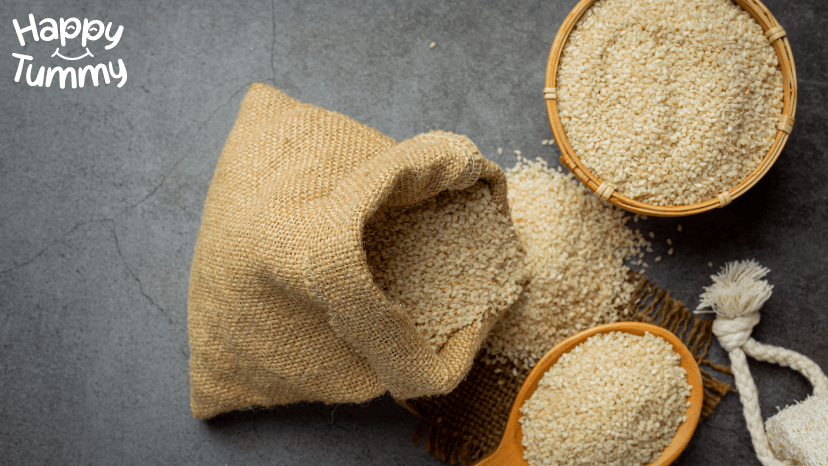
Sesame, or til, has been used in Indian cuisine for centuries and is preferred for its nutty flavour. They are available in three kinds: black, brown, and white.
Black sesame beej are the most nutritionally dense in minerals and antioxidants, while white sesame seeds have a milder flavour. It makes white til ideal for sweet dishes.
On the other hand, brown sesame seeds are somewhere between black and white in terms of nutritional profile and culinary uses. [31]
Health Benefits of Sesame (Gingelly seeds) [32] [33]
- Sesame seeds provide high iron and zinc, making them an excellent dietary choice for vegans who may lack these nutrients.
- Sesame seeds are the best source of calcium that contains far more calcium than dairy. A ½ cup of sesame seeds contains 3 times more calcium than A ½ cup of whole milk.
- Components like sesamin and sesamolin may lower cholesterol levels and promote heart health.
- It is high in omega-6 and vitamin E, which may help keep the skin healthy.
- In rural areas, its massage oil is used for body pain and may benefit neuralgia, age-related diseases, paralysis, gout, and rheumatism. [34]
Famous Sesame Seed Recipes
- Til ki chikki (jaggery, white sesame, and peanuts).
- Ellu urundai (Sesame Ladoo) (Needs jaggery, black sesame, and roasted nuts).
- Sesame seed pulao
- Sesame-coriander naan
- Til and jaggery halwa
6. Garden Cress Seeds (Halim or Aaliv)
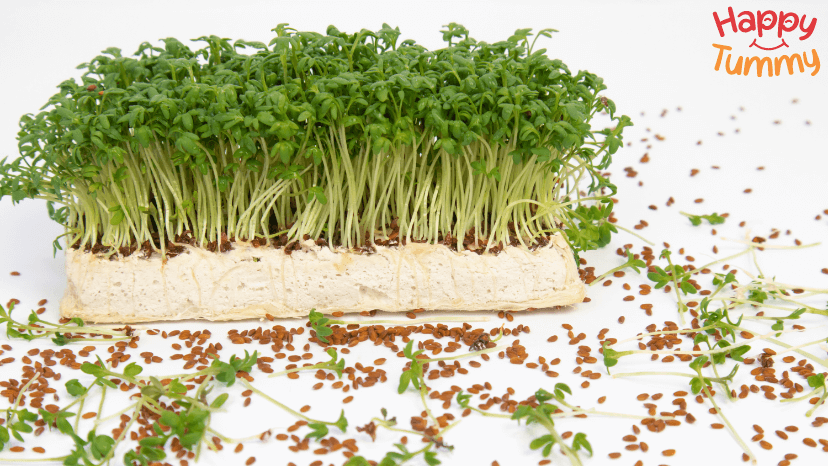
Garden cress is a reddish-brown seed loaded with proteins, omega-3 fats, vitamins (A to E), and traces of certain minerals. Halim beej are popularly eaten in India and have many health benefits, especially for women and the elderly. [35]
Health Benefits of Halim Seeds [36]
- It may promote bone health with high calcium content, which benefits older people.
- It may normalise irregular menstrual cycles due to the presence of estrogen-like chemicals in the seeds.
- The iron and vitamin content may help to combat haemoglobin and micronutrient deficiencies.
- It could aid in fracture healing and recovery.
- Contains analgesic effects. Thus, it may help relieve muscle aches & rheumatism and combat pain.
Pro tip: Roasted seed flour offers a better nutritional profile, shelf-life, and palatability than raw seed flour. [37]
Traditional Halim or Aaliv Recipes
- Halim ladoo (made with halim seeds, jaggery, and spices).
- Halim paratha (made with halim beej and whole wheat flour).
- Halim chutney
- Halim milk (prepared by soaking halim seeds in milk and adding sweeteners or fruits).
7. Pine seed (Chilgoza)
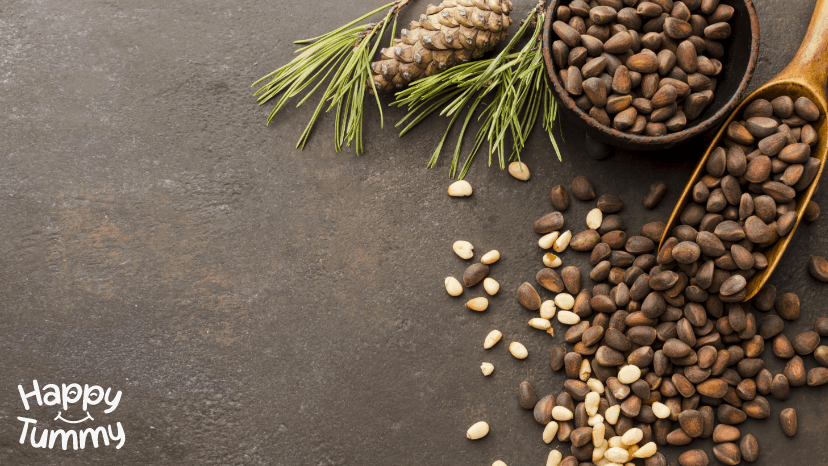
Pine seeds, known as Chilgoza, are harvested from the drier rocky slopes of Jammu & Kashmir and Himachal Pradesh. These dark brown, pointed beej are rich in nutrients and boast antioxidant and antimicrobial effects. Thus, it is a highly sought-after seed for both culinary and medicinal uses. [38]
Health Benefits of Pine Seeds [39]
- It is high in essential fatty acids, vitamins E and B-complex, and minerals like magnesium, calcium, and zinc.
- It contains polyphenols, xanthenes, and tocopherols that may counteract oxidative stress.
- It may help lower cholesterol levels and maintain a healthy lipid profile.
- It may improve insulin resistance and lower fasting blood glucose.
- The Vitamin E present in these seeds is required for maintaining the integrity of the cell membranes. It may also protect the skin from harmful UV rays.
Pro Tip: Add roasted pine seeds to your salads, granola, oats, or smoothies for extra crunch and flavour.
Indian Recipes Using Pine Seeds
- Beetroot chilgoza pulao
- Chilgoza coconut ladoo
- Chilgoza chutney, prepared with pine seeds, herbs, and spices.
- Chilgoza kheer or halwa
- Mixed dry fruits ladoo with pine seeds
Try Aashirvaad Svasti Ghee to roast your dry fruits, or simply drizzle over your preparations.
Aashirvaad organic pure cow ghee is the best way to enhance the taste of your meals with its authentic flavour and natural fragrance.
8. Safflower Seeds (Kusum dana)
Kusum dana or kusum ke beej are extremely beneficial beej for health as they contain unsaturated fats, vitamins, and antioxidants. Safflower seeds have been used in herbal medicine for a long time and are currently attracting attention for their possible heart-respiratory benefits. [40]
Health Benefits of Safflower Seeds [41]
- It may dilate arteries by lowering blood cholesterol , managing hypertension, and improving blood flow.
- They may have a potential role to play in reducing spasms and have also been used along with other herbs to treat respiratory diseases.
- It may effectively treat rheumatism and arthritis.
- It is used in Unani medicine as a laxative and may help relieve constipation.
Low fibre intake is the main cause of digestive problems today.
You can tackle this problem by checking your fibre status with Aashirvaad’s Digestive Quotient test features.
All it takes is two minutes to get your digestive score out of 100, which will help you better understand your gut health!
Indian Recipes Using Safflower Seeds
- Safflower beej and tamarind chutney
- Kusubi kheer
- Bottle gourd curry with safflower seeds milk
9. Fenugreek Seeds
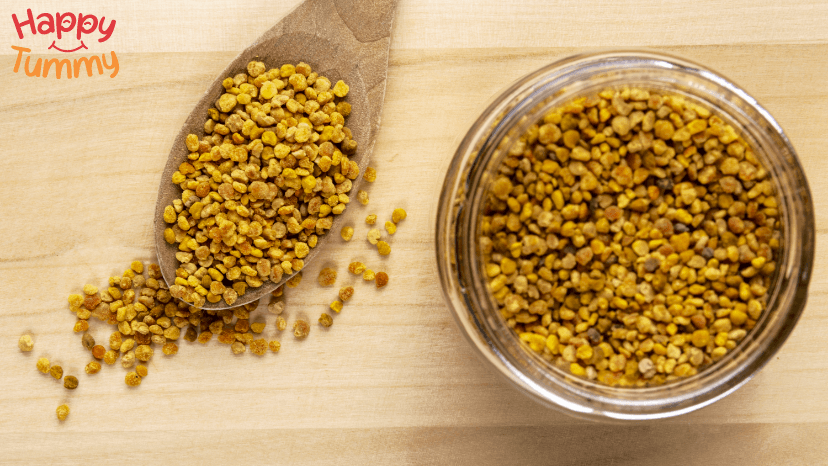
Fenugreek or methi seeds are used as a spice in various dishes. Beyond their medicinal properties, they are also utilised in food product development as stabilisers, emulsifiers, and adhesives due to their high fibre and protein content. [42]
Health Benefits of Fenugreek Seeds [43]
- It may help improve insulin sensitivity.[44]
- Fenugreek seeds are a rich source of soluble dietary fibre, which may help manage total cholesterol and LDL cholesterol levels, supporting cardiovascular health.
- Has galactagogue properties; thus, it may promote milk production in breastfeeding mothers.
- Fenugreek fiber may be useful for treating constipation. It minimizes the transit time through the intestine, helping to maintain a constant and steady stool.
Best Ways to Consume Fenugreek Seeds
- Sprout the seeds and add them to your salads.
- Soak them overnight and consume them on an empty stomach.
- Dry roast the seeds, grind them and use them in your curries.
10. Pomegranate seeds (Anaar ke Beej)
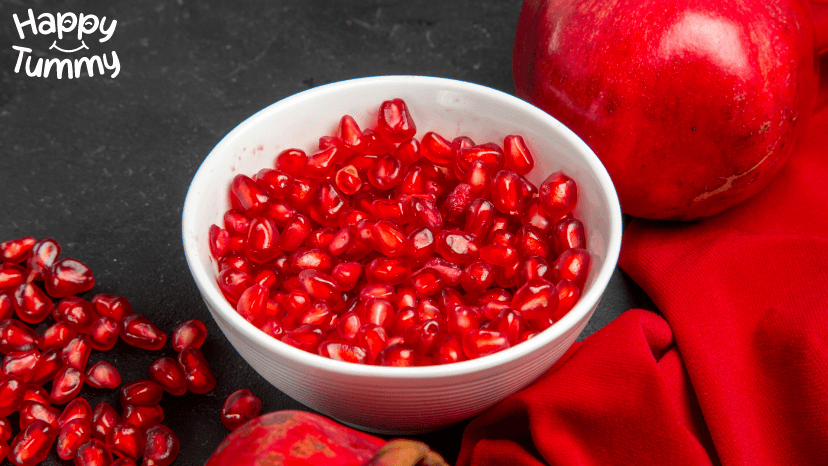
As delicious as the juicy pomegranate fruit feels, its beej are equally packed with nutritional treasures.
Did you know that when extracted, pomegranate seed oil (PSO) is particularly noteworthy for its high concentration of conjugated fatty acids, tocopherols, and phytosterols, contributing to its impressive health benefits? [45]
Health Benefits of Pomegranate Seeds[46]
- Their high insoluble fibre content showcases a laxative effect and, thus, may reduce constipation.
- It has high antihyperglycemic activity, which may help regulate blood sugar levels.
- It contains punicic acid, a potent antioxidant that may protect the skin and prevent premature ageing.
- Hydrolysable tannins in Anaar ke Beej may exhibit antibacterial, antifungal, and antiviral properties, helping fight infections.
Pro Tip: Sun-dry pomegranate arils for 4-5 days. Even after drying, they are sticky, so there is no need to worry. You can coarsely crush and store them in an airtight container.
Uses for Dried Pomegranate Seeds
- Add to chats, curries, rice dishes, or chutneys for a pop of sour flavour and crunchy texture.
- Make a powder for seasoning or spice mix in various recipes.
Nutritional Comparison of Top 10 Healthy Seeds
The following table compares ten seeds discussed above, highlighting their essential macronutrients and micronutrients per 100 grams. This comparison may help you understand the unique benefits each seed offers. [47]
| Protein (gm) | Total Fats (gm) | Total Dietary Fibre (gm) | Carbohydrate (gm) | Energy (KJ) | Other Key Nutrients | |
| Sesame Seeds (Gingelly Seeds, Black) | 19.17 | 43.10 | 17.16 | 10.29 | 2124 | Calcium, Iron, Magnesium, Phosphorus |
| Flaxseeds (Linseed) | 18.55 | 35.67 | 26.17 | 10.99 | 1857 | Omega-3 Fatty Acids, Lignans |
| Garden Cress Seeds (Halim or Aaliv) | 23.36 | 23.74 | 8.27 | 33.66 | 1863 | Calcium, Iron, Omega-3 Fatty Acids |
| Niger Seeds (Black) (Ramtil, Jagni or Jatangi) | 18.92 | 38.61 | 10.93 | 22.98 | 2144 | Calcium, Iron, Vitamin E |
| Pine Seeds (Chilgoza) | 12.55 | 48.79 | 3.79 | 26.77 | 2486 | Magnesium, Zinc, Vitamin K |
| Safflower Seeds | 17.66 | 30.87 | 13.49 | 30.18 | 1981 | Vitamin E, Linoleic Acid, Antioxidants |
| Sunflower Seeds | 23.53 | 51.85 | 10.80 | 6.85 | 2453 | Vitamin E, Magnesium, Selenium |
| Fenugreek Seeds | 25.41 | 5.72 | 47.55 | 10.57 | 983 | Iron, Magnesium, Manganese, fibre |
| Pomegranate Seeds | 1.33 | 0.15 | 2.83 | 11.58 | 229 | Vitamin C, Potassium, Antioxidants |
| Chia Seeds [48] | 17 | 31 | 56 | 42 | 486 | Calcium, Phenolic Compounds, Omega-3 Fatty Acids |
We strongly recommend you consult your doctor before adding any of the seeds mentioned above to your diet, especially if you are pregnant or have dietary restrictions.
If you are looking for certified expert opinions, Aashirvaad’s nutritionists offer personalised consultations. Based on your health, they will address all your queries and help you perfect your diet regimen.
Final Thoughts
We have understood above how the ten kinds of seeds from the nuts, oilseeds, and spices group can do miracles for health. Consuming these nutrient-rich seeds can be a valuable step towards leading a healthy lifestyle. Whether adding them to our meals or using them as toppings, even small and gradual changes can significantly improve our well-being.
Some of the practices you may adopt on the go are:
- A handful of seeds instead of deep-fried snacks
- Opt for dry fruits and seeds ladoo instead of sugar candies
- Drink chia seeds soaked in lemon juice as a healthier alternative instead of beverages with added sugar
As we embrace this seed revolution, let’s share these benefits with our loved ones to build a culture of health within our communities. Remember what Gandhi ji once said, “Be the change you want to see in the world.”
The goal is to work together to produce small transitions to wellness for ourselves and others. This will eventually have a ripple effect on wellness, reduce malnutrition cases, and improve India’s health status.
Frequently Asked Questions
There is no particular time of day for seeds to be consumed. They can be consumed throughout the day. You can include them for breakfast on your toast or as mid-morning or evening snacks along with nuts. It can enhance nutrient absorption and provide sustained energy throughout the day.
Chia beej are high in fibre, which promotes satiety and helps control appetite. When soaked, they expand in size, creating a gel-like texture that keeps you hydrated and feeling full for a long time. It makes them a great addition to weight-loss diets. [49] [50]
Sesame beej have a good amount of magnesium and calcium and contain healthy fats like omega-6 and vitamin E. They contain antioxidants and anti-inflammatory properties, which may support bone strength, provide health-promoting benefits and maintain healthy body functioning. [51] [52] [53]
Store seeds in an airtight container in a cool, dark place, such as a pantry or refrigerator, to keep them fresh. Some seeds contain healthy fats that can become rancid when exposed to light, heat, and air. Hence, seeds should be stored in an airtight container in a cool, dark place, such as a pantry or refrigerator, to keep them fresh and prevent rancidity as well. This helps prevent rancidity and preserves their nutritional value.
The recommended daily intake of seeds for a healthy individual/ with no specific health or nutrition needs and/or metabolic condition, consuming 2000kcal/d should consume 35 grams of nuts and seeds, which equates to around 2-3 tablespoons, and 27 grams of fat/oils. [54]
You may soak the seeds and consume them as soaking seeds before consumption improves nutrient absorption, reduces antinutritional factors and improves the nutritional potential of these seeds. [55]












